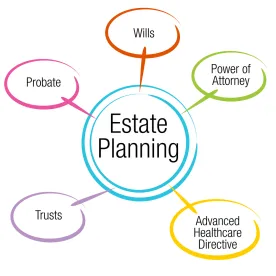Fiduciaries and family members often face challenges in managing the digital property owned by a person who has passed away or become disabled, especially if there is no plan and authorization for the management of those assets. Digital property includes electronically stored data, user accounts (such as email accounts, social networking accounts, and online storage accounts), virtual currency, and domain names.
Having a clear set of instructions for digital property in your estate will help avoid digital asset issues.
We recommend that individuals consider the following steps to proactively manage digital property assets as part of their estate plans.
-
Ensure the right people have access to digital assets. Many states, including Illinois, New York, California, and Florida, have recently adopted versions of the Revised Uniform Fiduciary Access to Digital Assets Act (RUFADAA). Under RUFADAA, an owner of digital property can give fiduciaries access to and authority to manage digital property. Without such consent, the fiduciary may not have access to electronic communications and other digital assets. Following the enactment of RUFADAA, our documents generally provide that the fiduciaries named in your estate planning documents (your executor, trustee, and agent under a power of attorney for property) will have the ability to access digital assets to the full extent allowed under law so that fiduciaries can collect and manage digital property to the same extent as financial property. Consider whether your named fiduciaries will be adequately equipped to access your digital assets. Inform counsel if this broad access is not appropriate for your circumstances, or if you have any other specific instructions or concerns regarding access to your digital assets.
-
Designate who should receive your digital assets. We recommend including specific provisions in your estate plan regarding who should receive your digital assets at your death. You should identify whom you would like to receive this property, especially if the desired recipients differ from those receiving your financial and tangible personal property. In thinking about who should receive your digital assets, consider property that has both monetary and non-monetary value. You may want to provide specific instructions for certain property, for example, digital photos. In addition, you should provide instructions if you wish to have certain digital property destroyed or deleted at your death.
-
Draw special attention to valuable or unique digital assets. Please advise us if you have any digital assets with significant monetary or non-monetary value or that are unique in nature. Examples of notable assets include virtual currency (e.g., bitcoin), highly followed social media accounts, valuable domain names, digital archives, and valuable virtual items in online games.
-
Use online tools to your advantage. Certain service providers allow users to designate a person to be contacted in the event of extended periods of inactivity or to provide instructions for deleting or preserving the account; however, these options are not yet prevalent. Below are notable examples of available options:
-
Facebook: Facebook allows you to determine in advance whether your account should be memorialized or deleted if you pass away. You can also name a Facebook legacy contact who will be able to manage aspects of your account if it is memorialized.
What is a legacy contact on Facebook?
How do I add, change or remove my legacy contact on Facebook?
What will happen to my Facebook account if I pass away? -
Google: Google's Inactive Account Manager feature allows you to designate trusted contacts to be notified if your account is inactive for a designated period of time. If you wish, you may also allow the contact to receive certain data from your Google account.
About Inactive Account Manager -
Password Managers: A password manager is a service that stores your website accounts and the usernames and passwords used to access them. Certain password managers allow you to designate an emergency contact who can access your usernames and passwords in the event of death or disability.
If you have made online designations please ensure you communicate with your estate planning professional so he/she can coordinate the provisions of your estate plan with these online tools, and keep a record of the designations in your file.




 />i
/>i

